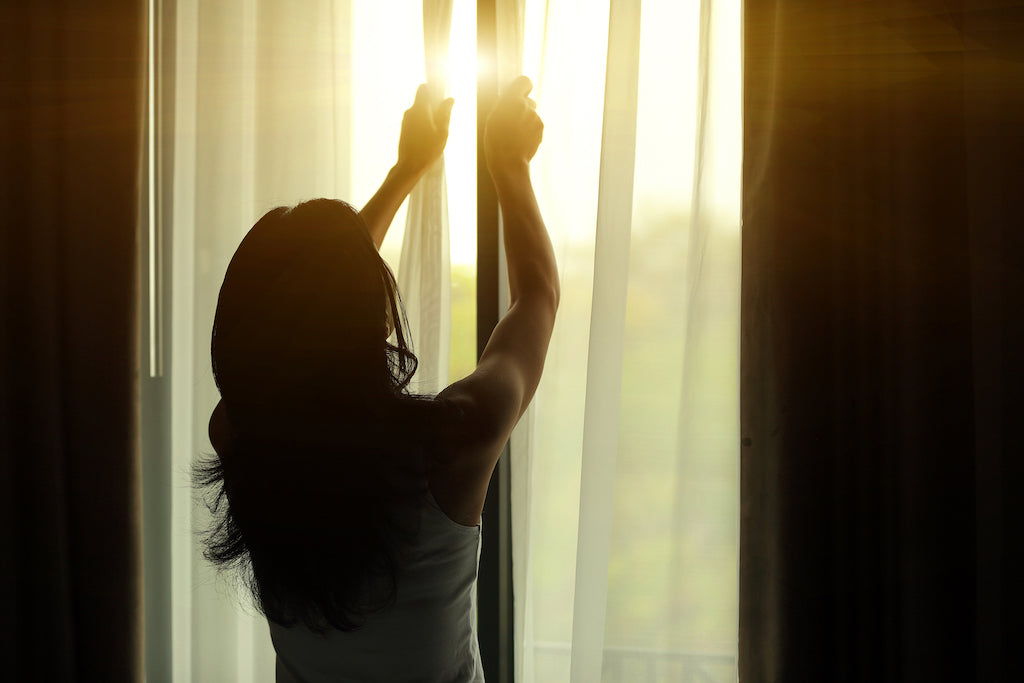Having trouble dozing off? You’re not alone. According to the Sleep Foundation, “Between 10% and 30% of adults struggle with chronic insomnia.”
Fortunately, you don’t have to live with restless nights.
“It’s not always necessary to get a prescription for a sleep aid,” writes Charlene Gamaldo, M.D., medical director of Johns Hopkins Center for Sleep. “There are natural ways to make adjustments to your sleeping habits.”
Ready to reclaim your ZZZs? We got in touch with our favorite sleep experts for all-natural tips for sleeping longer and deeper.
Here are their top suggestions:

Optimize your bedroom temperature
Recent sleep studies have found that the optimal temperature for sleep is quite cool, around 60 to 68 degrees Fahrenheit. Temperatures that fall too far below or above this range can lead to restlessness. Temperatures in this range help facilitate the decrease in core body temperature that in turn initiates sleepiness. A growing number of studies are finding that temperature regulation plays a role in many cases of chronic insomnia.
Researchers have shown, for example, that insomniacs tend to have a warmer core body temperature than normal sleepers just before bed, which leads to heightened arousal and a struggle to fall asleep. For troubled sleepers, a cool room and a hot-water bottle placed at the feet, which rapidly dilates blood vessels and therefore actually helps lower core temperature, can push the internal thermostat to a better setting.
Anita Mahaffey, Environmental Sleep Specialist and CEO/Founder, Cool-jams, Inc.

Manage your sun and light exposure
One easy, effective, and often overlooked tip for getting better sleep at night is getting sun and light exposure in the morning. This is easily accomplished by getting 5-10 minutes of direct sunlight in the first hour after waking (opt out of sunglasses to maximize the light coming in through your eyes, but don't look directly at the sun for obvious reasons).
Our circadian rhythm, also known as our sleep/wake cycle, is governed by one thing: light. Primitive humans didn't have a lot of constants in their day to day, so we evolved to use the sun as our natural alarm clock and circadian rhythm regulator. Getting exposure to the sun first thing in the morning (within an hour of waking) not only helps you to wake up and shake off grogginess easier, it also regulates your sleep hormones including cortisol and melatonin. This means that just 5-10 minutes of sun exposure in the morning can increase your energy during the day and help you get better sleep at night.
You can still get light exposure on a cloudy day, but if you experience dark mornings (due to weather or seasonality), a sun lamp can be a great substitute to help you wake up easier and sleep better at night.
Rachel Hoeppner, Certified Holistic Nutritionist and Integrative Nutrition Health Coach

Supplement with magnesium
I like to take magnesium at night when I feel overly anxious or need to quiet the mind before sleep. It has a powerful calming effect on the nervous system, and it controls the hormones that allow you to sleep better, such as cortisol and melatonin.
According to one study, magnesium supplementation can help improve quality of sleep, the time it takes to fall asleep, and total sleep time. It can also assist in reducing early morning awakenings, managing cortisol levels, and regulating melatonin.
Keep in mind that magnesium also has a laxative effect. It's definitely not something you want to take a lot of at night, or else you may end up with stomach discomfort or diarrhea. If you’ve never taken a magnesium supplement before, start with low doses and see how it affects you. This may be personal to me, but I find that taking higher doses leads to strange dreams!
Heather Hanks, Nutritionist

Progressive muscle relaxation
Progressive muscle relaxation (or PMR) works by decreasing both anxiety and muscle tension. The method gradually relaxes muscles through a combination of controlled breathing and systematic muscle tensing and relaxation.
Start by lying on your back. You can lie anywhere that's comfortable. Slow your breathing into even, moderate lengths. Breathing in for five seconds and out for five seconds is a good place to start.
Begin with your right arm. Tense all of the muscles in your right arm and hold it for five seconds, then release the tension and allow the muscles to relax for 10 seconds. After the right arm, move on to the left, then forehead, eyes, cheeks, neck, shoulders, back, stomach, legs, and all other major muscle groups. Maintain a relaxed, controlled, and even breathing tempo throughout the process.
Derek Hales, Founder & Editor-in-Chief, NapLab.com

Get regular physical activity
Many people think physical activity has to be an all-or-nothing thing, but the truth is you don't have to have an intense sweat session to reap the benefits, which includes better sleep. Regular physical activity can improve your sleep quality as it reduces the time it takes to fall asleep.
The 2003 Sleep in America poll found that those who worked out once per week or less are prone to have less than six hours per night on average, which we all know is below the recommended 7-8 hours of sleep recommended for adults.
Physical activity is also known to reduce the risk of other health issues and diseases, like Type 2 diabetes and heart disease, that can lead to poorer sleep.
Brittany Lubeck, MS, RD, Nutritional Consultant, Oh So Spotless

